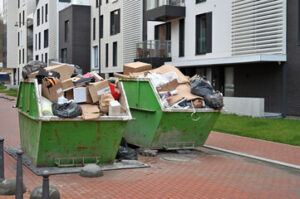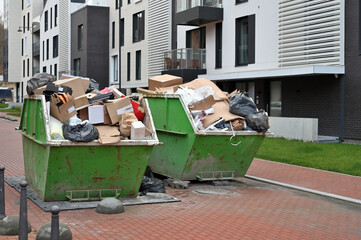Maintaining a clean and clutter-free space is essential for a healthy and organized living environment. Accumulated waste not only affects aesthetics but can also lead to health hazards and reduced productivity.
Reliable trash removal solutions are crucial in ensuring that waste is managed efficiently, keeping spaces clean, and contributing to overall well-being. Understanding effective trash removal methods and implementing sustainable practices can make a significant difference in maintaining cleanliness. Contact Scottsdale Junk Removal for professional help.
Trash removal begins with the proper segregation of waste. Sorting items into categories such as recyclables, organic waste, and non-recyclable materials allows for efficient disposal and recycling processes. Recyclables, including plastics, glass, paper, and metals, should be collected separately and directed to appropriate recycling facilities. Organic waste, such as food scraps and yard waste, can be composted, reducing landfill contributions and creating nutrient-rich soil amendments. Properly identifying and disposing of hazardous materials, including batteries, electronics, and chemicals, ensures that they do not pose a risk to health or the environment.
Regular waste collection schedules play an integral role in maintaining a clutter-free space. Ensuring that trash is removed at consistent intervals prevents the accumulation of waste that can lead to unpleasant odors and potential pest infestations. Reliable collection services provide a convenient solution for handling household, commercial, and industrial waste, making it easier for individuals and businesses to manage their disposal needs without inconvenience. Adhering to designated collection days and placing waste in appropriate bins or containers further enhances efficiency in trash management.
Sustainable disposal methods contribute to reducing environmental impact. Landfills remain a common disposal method, but they should be used as a last resort. Recycling and composting initiatives help divert significant amounts of waste from landfills, conserving natural resources and reducing greenhouse gas emissions. Waste-to-energy technologies, such as incineration and anaerobic digestion, offer alternatives that convert trash into energy, minimizing environmental footprints while generating power. Emphasizing responsible disposal practices ensures that waste management aligns with sustainability goals.
For bulk waste and large-scale cleanouts, specialized removal services offer efficient solutions. Renovation projects, office cleanouts, and household decluttering efforts often result in significant amounts of waste that cannot be handled through regular collection services. Engaging professional haulers or rental bin services provides a practical approach to disposing of bulk items, furniture, and construction debris. These services help streamline waste removal, preventing unnecessary accumulation and ensuring that large items are processed appropriately.
Community participation in waste reduction efforts fosters a cleaner environment. Encouraging responsible waste habits among individuals and organizations enhances overall efficiency in trash management. Educational initiatives that promote recycling awareness, composting practices, and waste reduction strategies empower people to adopt sustainable behaviors. Implementing policies that support environmental stewardship, such as plastic reduction programs and zero-waste initiatives, further strengthens waste management efforts. Collaboration between residents, businesses, and waste service providers creates a collective approach to maintaining cleaner spaces.
Adopting minimalism and conscious consumption habits also play a significant role in reducing waste generation. Mindful purchasing decisions, opting for reusable products, and avoiding excessive packaging contribute to waste reduction at the source. Donating usable items, repurposing materials, and embracing upcycling techniques extend the lifespan of products, minimizing disposal needs. A proactive approach to consumption and disposal ensures that waste levels remain manageable, reducing the overall burden on waste management systems.
Technology plays a transformative role in modern waste management. Innovations such as smart waste bins, automated sorting facilities, and digital tracking systems enhance efficiency in trash removal processes. Smart waste collection systems optimize routes, reducing fuel consumption and operational costs. Advanced recycling technologies improve material recovery, increasing the viability of sustainable waste management. Integrating technology-driven solutions strengthens overall waste disposal practices, making them more effective and environmentally friendly.
Reliable trash removal solutions require a combination of proper waste segregation, consistent collection services, sustainable disposal methods, community involvement, and technological advancements. Maintaining a clutter-free space goes beyond simple disposal; it involves adopting responsible waste management habits and supporting initiatives that contribute to long-term environmental health. By prioritizing efficient waste management practices, individuals and organizations can create cleaner, healthier spaces while minimizing their ecological footprint. A commitment to responsible trash removal not only enhances immediate surroundings but also contributes to a more sustainable future for generations to come.
Investing in long-term waste management strategies ensures that spaces remain clutter-free and that environmental responsibilities are upheld. Governments and private organizations can work together to improve infrastructure, enhance waste collection efficiency, and establish policies that encourage waste reduction. Developing robust recycling programs and accessible composting facilities can empower communities to participate in sustainable waste management actively. Additionally, incentivizing waste reduction through rewards programs and financial benefits can motivate individuals and businesses to adopt eco-friendly practices.
Public awareness campaigns and educational programs play an essential role in instilling responsible waste management habits. Schools, workplaces, and local organizations can integrate environmental awareness into their initiatives, teaching individuals about the benefits of reducing waste and adopting sustainable disposal methods. Encouraging creative solutions, such as art projects using recycled materials or community clean-up drives, fosters a sense of responsibility and involvement in waste management efforts.
Legislation and regulations also contribute to more effective waste management. Governments can implement stricter policies on waste disposal, requiring businesses to comply with sustainability standards and minimizing industrial waste. Implementing bans on single-use plastics, enforcing extended producer responsibility programs, and establishing landfill diversion goals contribute to a more structured approach to waste reduction. Regulations that promote sustainable packaging, responsible manufacturing, and ethical disposal help create a more efficient waste management system.
Efficient waste management extends to urban planning and infrastructure development. Designing cities with adequate waste collection points, recycling facilities, and composting stations facilitates proper disposal and minimizes littering. Green building initiatives, which incorporate sustainable materials and waste-efficient construction methods, contribute to waste reduction in urban areas. Implementing innovative waste processing solutions, such as biodegradable packaging alternatives and sustainable product design, supports a circular economy that reduces the overall waste burden.
Businesses also play a critical role in waste reduction and responsible disposal. Companies can implement corporate sustainability initiatives that prioritize waste management and eco-friendly operations. Reducing paper waste, optimizing supply chain processes, and encouraging employees to participate in waste reduction programs help businesses contribute to a cleaner environment. Sustainable business models that integrate circular economy principles, such as product take-back programs and sustainable sourcing, further enhance waste reduction efforts.
Consumer awareness and responsibility are key factors in maintaining a clutter-free space and effective waste management. Individuals can make a difference by actively participating in waste reduction efforts, choosing products with minimal environmental impact, and supporting businesses that prioritize sustainability. Simple actions such as carrying reusable bags, composting organic waste, and minimizing electronic waste contribute to significant positive changes in waste management.
As societies continue to evolve, the need for reliable trash removal solutions becomes more critical. Addressing waste management challenges requires collaboration between individuals, businesses, and governments. By implementing proactive waste management strategies, embracing sustainability, and promoting responsible consumption, communities can create cleaner, healthier, and more sustainable environments. A commitment to waste reduction and proper disposal not only improves quality of life but also ensures that future generations inherit a planet that is well-preserved and capable of supporting sustainable living.

